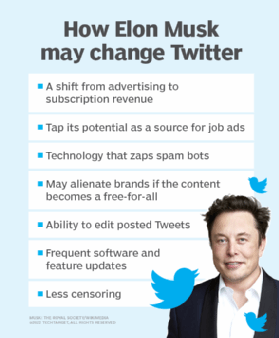
jamesteohart - stock.adobe.com
How Musk's Twitter takeover could affect business accounts
Potential changes to Twitter's advertising and security policies are top issues for business owners who rely on the social media platform for brand visibility and sales.
Elon Musk's potential changes to Twitter's advertising and security policies are top priorities for business owners who rely on Twitter accounts.In Elon Musk's first hours of owning Twitter, the billionaire fired the company's CEO and a key legal executive in charge of content moderation. He took to the social media platform to declare "the bird is free." Business users are concerned about which flight path the free bird might take.
CEO Parag Agrawal and CFO Ned Segal were terminated immediately after the deal closed on Friday, according to reports.
Musk also fired Vijaya Gadde, Twitter's "moral authority" in charge of trust and safety, legal and public policy. Gadde reportedly drove controversial decisions, including removing political ads and banning former President Donald Trump after the Jan. 6 attack on the U.S. Capital. Sean Edgett, general counsel, was also terminated.
The moves culminate a months-long back and forth between Musk and Twitter's leaders that included legal battles and accusations about mismanagement of the platform's user data, advertising, and financial strategy.
Industry watchers said they expected top leaders to be fired and are prepared for more turmoil in the weeks ahead as Musk attempts to execute his vision for the platform.
"The hope here is that under all [of Musk's] audacity still lurks a business leader who will quickly understand that chaos breeds caution from anyone holding purse strings -- be them investors, advertisers or subscribers," said Liz Miller, a customer experience analyst at Constellation Research. "He will need to quickly demonstrate and clearly articulate his business vision for Twitter. And that has to be a bigger message than his 'social' vision for Twitter.
"Free speech in the town square is great for the crowd, but the paying crowd expects to hear the business value and long-term viable business proposition," she said.
The Internet Accountability Project (IAP) issued a statement saying Musk's ownership of Twitter "marks a significant victory for advocates of free speech" but warned that antitrust enforcement and reform of Section 230 of the Communications Decency Act, which protects companies from liability for speech or information posted on their platforms, is more urgent than ever.
"Free political expression online shouldn't depend on the benevolence of billionaires. Legislative action is needed to secure true internet freedom," according to the statement attributed to Mike Davis, founder and president of IAP.
Content moderation is one of a number of controversial policies Musk said he intends to address as head of the company.
Twitter advertising
For business owners who rely on Twitter to advance their brand and sell products, changes to Twitter's advertising policies and security are top of mind.
In May, Musk floated the idea of imposing a "slight cost" for commercial and government users. It remains to be seen whether business accounts will require subscriptions, but Musk is expected to implement revenue-generating policies for the company he paid $44 billion for.

It wouldn't be the first subscription strategy for Twitter. The company launched Twitter Blue in 2021 to "a specific segment of engaged users" for $4.99 per month to provide ad-free content, the ability to delete Tweets, and other features.
"The first thing I hope Elon Musk realizes is that the business of Twitter is as an advertising platform. So his strategy starts there and then looks at the various other streams of business and revenue his new vision of Twitter might take on," Miller said
That could conceivably include everything from subscriptions for exclusive experiences, interactive engagements or new forms of interaction, she said.
Musk's concept of a civic town square could lead to a larger audience and more opportunities for advertisers to reach and engage with a broader audience -- if the audience finds value in it, Miller said.
"The problem here is that in today's digital experience economy, the audience is actively defining what value is and will decide if advertising or subscription access is part of that value proposition," she said. "That will not be up to Elon Musk. All he will be able to influence is what Twitter's part of a 50-50 exchange of value will look like."
Musk issued a statement to advertisers this week explaining the value of personalized advertising and asserted his goal of making Twitter the "most respected advertising platform in the world."
"It is essential to show Twitter users advertising that is as relevant as possible to their needs. Low relevancy ads are spam, but highly relevant ads are actually content," Musk tweeted.
The number of fake Twitter accounts and scammers on the platform is a concern for business owners whose brands and customers have been damaged by fraud. The problem is rampant across social media platforms, including LinkedIn, Facebook and Instagram. But removing fake Twitter accounts appears to be more difficult than other platforms.
Rapid7, which sells a Threat Command tool for identifying and removing fake social media accounts, contacts platform providers and shares its evidence to justify account takedowns. A company spokesperson said Rapid7 can remove fraudulent accounts from LinkedIn 99% of the time as well as Facebook and Instagram 95% of the time, but only 82% of fake Twitter accounts are removed.
Musk must set clear guidelines for what content moderation will look like moving forward to keep advertisers on the platform, said Insider Intelligence analyst Jasmine Enberg.
"Twitter's ad business is already on shaky ground. Uncertainty arising from the weak economy and Musk's erratic behavior have led to advertiser pullback," Enberg said in an emailed statement.
In addition, corporate media and innovation budgets will be tight in the year ahead, which means marketing leaders will be forced to stick to social channels that help them get short-term growth wins, said Mike Proulx, a Forrester Research analyst.
"Twitter's uncertain direction, especially with regard to content moderation, means that reticence to advertise on Twitter will only be compounded," he said. "Musk has much work to do to earn the trust of advertisers. No mainstream companies want to be in spaces that aren't brand safe, period."
Twitter security
This summer, Twitter's security policies came under fire with the release of a whistleblower report saying the company's internal policies violate Federal Trade Commission settlement rules and put user data at risk. The whistleblower also claimed that Twitter used private information for targeted ads and executives allowed spam and Twitterbot accounts to remain live to boost the company's active user numbers.
In May, the company was fined $150 million by the Department of Justice for allowing personal information users provided for two-factor authentication to be used in targeted advertisements.
Musk cited the security issues named in the whistleblower report as reason to back out of the deal in September.
Business account holders hope Musk improves security and digital safety as well as provides trustworthy visibility into metrics not provided by the leadership team, Miller said.
"Even dating back to the Dorsey era, Twitter has struggled with accurate accounting of ad spend and visibility and transparency into safety," Miller said. "There is a lot of optimism out there that any change and fresh leadership will bring about movement here, but time will tell. And that time will need to start as early as next week. There will be a shrinking window of opportunity for Musk to make changes that will be believed."
Meanwhile, industry watchers, such as Tech Policy Press, say Musk's private ownership of the global social media platform is a national security concern given his communications with foreign adversaries.
Twitter did not respond to a request for comment.







